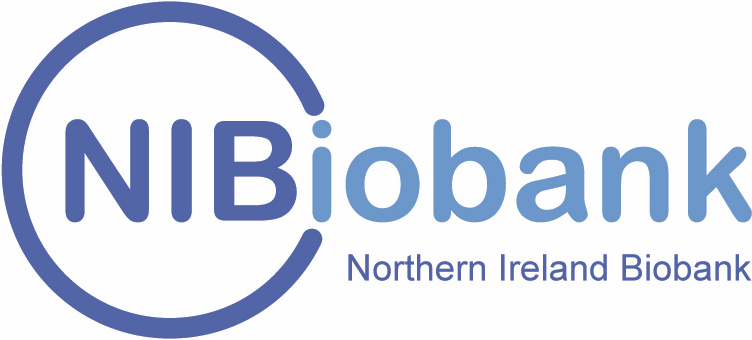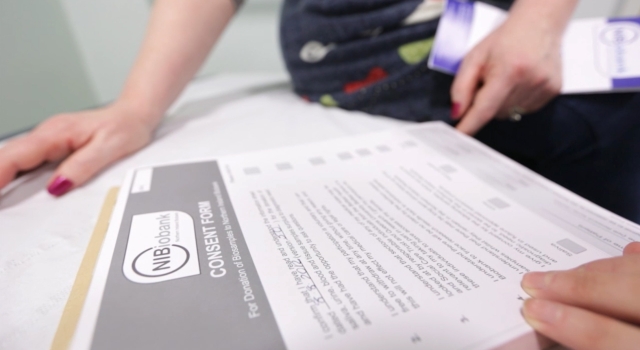Frequently asked questions
-
How do I donate samples to NIB?
To donate samples to the Northern Ireland Biobank (NIB), you must currently be a patient of the Belfast Health and Social Care Trust. This can be as an out-patient attending a clinic, or an inpatient in a ward. You may be asked by a member of the clinical team if you wish someone from NIB to discuss sample donation and consent with you.
Participation is entirely voluntary. You are under no obligation to donate samples, and refusal will not affect your routine care in any way.
-
What happens if I agree to donate samples?
Firstly, you will sign a form to give consent for your samples to be donated to NIB for research purposes.
We will ask your permission to collect a small amount of blood from you, this can be up to 40mls, which is approximately 8 teaspoons. In certain cases, where relevant, we may also request an additional sample of bodily fluid such as urine, saliva or ascites.
If you are having a surgical procedure, the tissue that is removed will be sent to the hospital laboratory for analysis. The priority of the Health Trust will be your diagnosis; however, not all of the material removed may be needed for this. In the normal course of events, any surplus or leftover material is discarded. With your permission, we will bank some of this leftover material so that it may be used for future research projects.
-
What will happen to my donated samples?
Your samples will be labelled with a unique NIB number and transferred to our secure storage facility in Queen's University Belfast. Most samples are stored here until they are ready to be released to an ethically approved research study. At the time of donation, we will not always know what study your samples will be used for; however, they may be used in the future for the following types of research studies:
Cell Culture Models
On occasions, a sample may be released immediately after it has been received by NIB to allow cells to be put into culture. Some scientists wish to study how diseased cells grow and are maintained in the body. They can use laboratory techniques to study how individual cells respond to new drugs and treatments. The cells may be grown on special plastic dishes or in three-dimensional gels in the laboratory environment, or they may be stored in a freezer for a period of time and studied at a later date. Some cells may need to be treated with laboratory reagents to make them grow indefinitely in culture so that scientists can study how they grow over longer periods of time.
Genetic Analysis
Some samples may have their DNA extracted. DNA is used to make genes that control development, growth, eye colour and many other things. When certain genes and proteins in the body become abnormal, they can cause normal cells to become diseased. It is an important part of research to understand what genes and proteins do within cells. We may therefore use part of your sample to obtain DNA (genetic material) and make it available to research groups to try to find out what gene patterns may increase the risk of different types of disease or to see whether we can predict what treatment may be best.
-
What are the risks and benefits?
Samples will mostly be taken as part of your routine procedure or care, so there should be minimal risk associated with donation.
You may not directly benefit from your donation. Rather, your participation will add to medical knowledge for future generations and may help in the discovery of new treatments for serious illnesses and conditions.
-
Do you need my personal information?
We need to collect and hold personal information (name, address, Health and Care number, date of birth) to make sure we are matching the correct medical record to the correct donated samples. This is stored securely in our QUB electronic tissue bank database.
We will also collect and hold personal information about your diagnosis and treatment, such as specimen type, pathology and date of operation. Researchers may apply through a formal process to get access to information linked to your samples to better understand the risk of certain diseases and how to develop new treatments. However, when information is released to a researcher, it is linked only to your unique NIB code number. We never give researchers your personal identifiable information such as date of birth, address or Health and Care number.
We take the privacy of our donors seriously. To protect privacy, we:
- Remove personal identifiers such as name or date of birth from samples and information, and assign a unique NIB code number instead. Samples and data released by NIB will not be traceable to the donor as they are labelled only with this unique code.
- Use security measures such as data encryption and access controls to ensure only authorised individuals have access to your personal information stored on our electronic database.
As consent to ‘gifting’ your samples will be enduring, we will continue to hold samples and information unless you advise us that you wish to withdraw consent.
-
Who can access samples donated to NIB?
Only approved research studies can get access to samples held by NIB. Researchers must demonstrate that their studies are ethical and of high quality. Independent experts will give their specialist opinion on the proposed research before access to tissues is approved.
Samples may be released to academic institutions, the NHS or commercial companies. Future approved research using your samples may result in financial gain to commercial organisations which are developing new tests and treatments. However, no direct financial benefit will accrue to NIB or to you as a donor.
-
Can I change my mind?
If you consent to NIB and then change your mind, you can withdraw your consent at any time by phoning or writing to the NIB Administrator. Withdrawing consent from the NIB will NOT affect your routine treatment or care in any way.
-
Why do researchers need my sample?
The human body is made up of many different types of cells, and all cells contain proteins and DNA. DNA is used to make genes that control development, growth, eye colour and many other things. When certain genes and proteins in the body become abnormal, they can cause normal cells to become diseased. It is an important part of research to understand what genes and proteins do within cells. We may use part of your sample to analyse your DNA (genetic material). We are asking you to allow us to extract DNA so that research groups can try to find out what gene patterns may affect the risk of different types of diseases or to see whether we can predict what treatment may be best for people with particular genetic patterns. Some scientists wish to study how diseased cells grow and are maintained in the body. They can use laboratory techniques to study how individual cells respond to new drugs and treatments. The cells may be grown on special plastic dishes or in three-dimensional gels in the laboratory environment, or they may be stored in a freezer for a period of time and studied at a later date. Some cells may need to be treated with laboratory reagents to make them grow indefinitely in culture so that scientists can study how they grow over longer periods of time. These are known as cell culture models.
-
Who can apply to use my samples?
Researchers requesting access to tissue samples from NIB will have to demonstrate that their studies are of high quality. Independent experts chosen from the NIB Scientific Review Committee will give their specialist opinion on the quality of the research proposed before access to tissues is approved. Samples collected by the NIB are available to both academic institutions and commercial companies. Future approved research using your tissue samples or derivatives may result in financial gain to partner organisations which are developing new tests and treatments. In such an event, no direct financial benefit will accrue to NIB or to donors. NIB-approved projects could also involve portions of your samples being exported to research laboratories in other countries worldwide.

